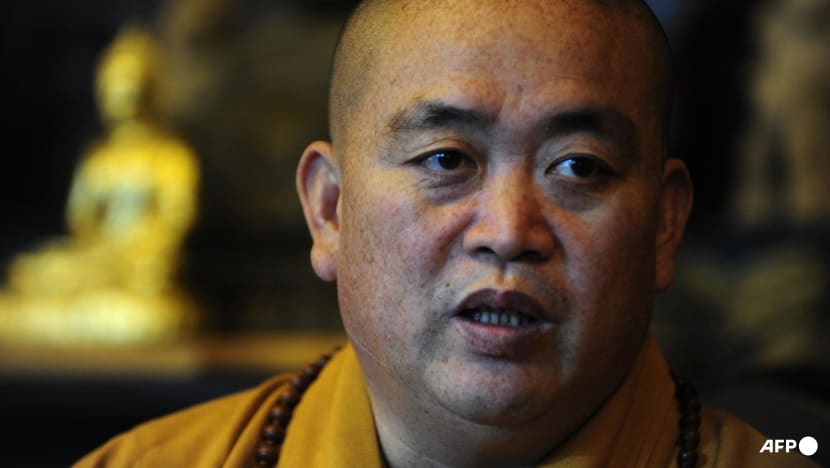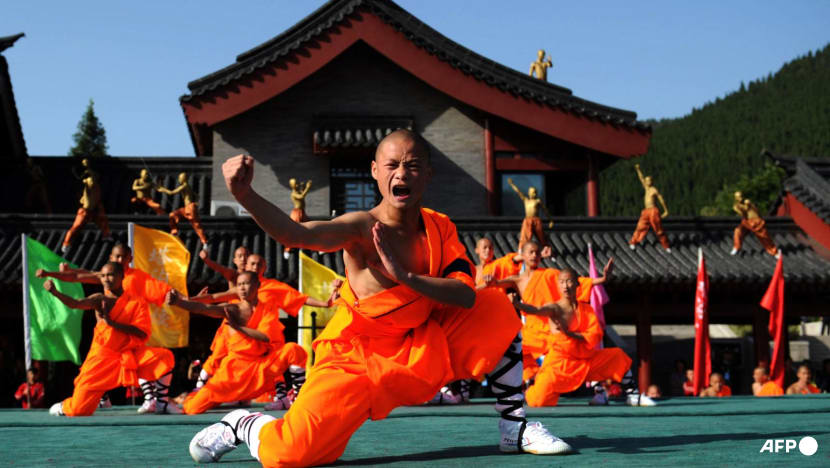After Shaolin Temple scandal, China’s Buddhists urged to obey the law and pay taxes
“Buddhist clergy, especially leading figures, must strengthen their awareness of the rule of law, remain vigilant and never cross the legal red line,” the association said.

The abbot of Shaolin Temple, Shi Yongxin, speaks at the famous temple in Henan province on Nov 8, 2009. (File photo: AFP/Peter Parks)

This audio is generated by an AI tool.
Buddhists should obey the law, be patriotic, pay taxes and “play an active role in building the nation and society”, China’s Buddhist regulator said on Tuesday (Aug 19), speaking out for the second time this month about the disgraced abbot of Shaolin Temple.
In a statement on its website, the Buddhist Association of China said that Shi Yongxin, the former abbot, had misappropriated and embezzled funds and temple assets, violated Buddhist regulations, and was suspected of criminal offences.
“This has tarnished the reputation of the Buddhist community in China. Therefore, Buddhist clergy, especially leading figures, must strengthen their awareness of the rule of law, remain vigilant and never cross the legal red line,” the association said.
It said Buddhists were citizens of China first and foremost and should be bound by law. According to the statement, committing crimes creates evil karma, so compliance with the law is a fundamental requirement of Buddhist teachings.
It also referred to some specific religious prohibitions, without saying whether Shi had violated them.
“Buddhist scripture requires the ordained to not betray the nation, not slander the country’s leaders, not evade taxes and not violate laws,” the statement said.

The Communist Party’s policy of “Sinicising religion” aims to bring all doctrines and practices into line with its ideology and ensure loyalty to the party and state.
In a 2021 national conference on religious affairs, President Xi Jinping said religious groups should strengthen their self-management. He also stressed the need to improve the rule of law in governance of religious affairs.
Shi, known as the “CEO monk”, is facing a criminal investigation over accusations that he embezzled project funds and temple assets. He is also accused of maintaining improper relationships with multiple women and fathering children with them, according to a statement released by the temple last month.
The association has cancelled Shi’s ordination certificate.
Shi is known for transforming the 1,500-year-old temple in central China’s Henan province into a multibillion-dollar global brand.
Under his leadership, the temple appeared in films and launched an online shop, and Shaolin kung fu was the subject of multiple books.
His critics had accused him of over-commercialising the Shaolin brand, including his plans to build a complex in Australia encompassing a temple, a four-star hotel, kung fu academy and educational facilities.
Shi Yinle, who was leader of the White Horse Temple, also in Henan, for 20 years, has been appointed the new abbot of Shaolin Temple.
In media reports, he has been portrayed as a sharp contrast to his predecessor.
During his time at White Horse Temple, he kept a low profile and was photographed operating a bulldozer during wheat planting season. When asked to comment on the commercialisation of Shaolin, he said that White Horse Temple had “insisted on following Buddhist traditions to preserve Buddhist culture”.
In a visit to Shaolin last week, Guangzhou-based Time Weekly magazine reported that the temple had stopped taking donations from tourists, and QR codes posted in the temple had been disabled. Incense has also become free of charge to temple visitors, according to the report.
This article was first published on SCMP.
















